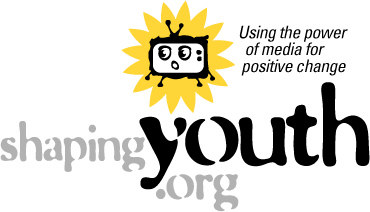Fun Tools To Teach Wellness: A Resource Roundup
Visit Shaping Youth’s “nutrition/wellness” category for articles/links/updates on media and food marketing in pop culture.
Here are a few favorite digital tools and wellness resources which we repeatedly use in our Dare to Compare: Gross Out Game for Good Nutrition hands-on wellness games.
Food for Thought: Health Literacy
Brian Wansink Ph.D. Food & Brand Lab:
Teaching Toolbox on his site Mindless Eating.org
Fun “One Page Wonders” in-class activities
Full Class Session Modules free health literacy games
Food Facts.com: “Find out what’s really in your food” (ingredients/allergens/claims)
Digital Ads.org: Interactive food & beverage marketing case studies (industry tactics)
Food Marketing.org: 125+orgs/academics working to eliminate harmful food marketing
Healthy School Foods Now: Interactive look at new school meal/snack standards
CSPI Center for Science in the Public Interest food analysis, policy/advocacy
Nutrition Action Newsletter CSPI’s subscriber-based health literacy
Prevention Institute: Claiming Health: Front of package labeling of children’s foods
Infographics, Visual Insights, Interactives, Digital Tools
RWJF/Pew School Snacks handy infographic Healthy School Foods Now.org
School lunch interactive: Calculating the cost/choices w/set amount of lunch money
CSPI: Is Menu Labeling Working?
Media Smarts, Canada: Interactive unit: food marketing on the web (bkgd for educators)
PBS Kids: Don’t Buy It, Get Media Smart (food advertising tricks, design a cereal box)
Smart Mouth: CSPI factoids/kids site
Nourish Interactive health games, teaching aids, nutrition tools
Playnormous.com health games, edu/research/role play, creators of Escape from Diab
How Obesity Harms a Child’s Body and fast food A-Z nutrient charts
Nutrition Calculators/Comparisons
Children’s Nutrition Research Ctr/Baylor: healthy eating calculator/energy
Nutrition Data: (Self) Conversions, calories, nutrients
Local Harvest.org Find a farmer’s market near you
Eat This, Not That Kids food menu grades
Cybraryman: Calculators and nutrition in schools/link list
Latest Policy/Research, Fact Sheets/Articles (2013 presentation)
USDA New policy: Smart Snacks in School (synopsis)
USDA Food & Nutrition School Snacks Full Document: June 28, 2013 (54pp pdf)
World Health Org June ‘13: Marketing Junk Food to Kids: “Disastrously Effective”
World Health Organization: Sodium intake for adults/children: (53pp pdf)
FTC Updated Report (M.Nestle/summary) Food Marketing to Kids (356pp pdf)
ThinkProgress: American Heart Assn Study: 80% of US teens on way to heart disease
Healthland Time: What the New USDA Healthier Snack Rules Mean for Schools
NYTimes, Feb ‘13: The Extraordinary Science of Addictive Junk Food v Michael Moss’ new book “Salt, Sugar, Fat: How the Food Giants Hooked Us”
Prevention Institute: The Facts on Junk Food Marketing and Kids
10 Gross Food Finds Ingredients In Your Food (useful in counter-marketing games)
New Stanford study published in Psychological Science: Nutritional awareness through food-themed stories helps preschoolers eat healthier voluntarily
Best Practices & Handful of Wellness Resources:
No Kid Hungry.org best practices in nutrition education
Choose My Plate.gov (replaces My Pyramid)
NIH kids: Portion distortion, serving size quizzes
CDC Health Literacy Goals, standards, activities by region/state
FDA Updated Food Labeling Guide details on nutrition labels & health claims
The Food Studies Institute K-4 “Food is Elementary” health literacy
Healthy Child.org safer foods, environmental info on chem cuisine/kids
Food and Health.com culinary resources for health educators
Help Guide.org: Nutrition/healthy eating guide for children/teens (overview)
Nutrition Vision consumer/pro resources for digital health
Zamzee.com Activity meter (fee-based accelerometer/health gamification) Hope Labs
Weasel Words/Watch Words for Teaching Health Literacy to Kids
“Part of…” (a balanced diet)
(a healthy breakfast)
“The taste of real…”(butter, cheese, fruit…)
“Supports, enhances, maintains, suppresses (hedging on product claims, NO FDA guidelines…Also note “Structure/function claims”…examples:
“Optimizes” (bone health…)
“Helps promote” (urinary health)
“Maintains” (healthy lung function)
“This evidence is not conclusive” (beware of disclaimers, especially after wordy FDA ‘preliminary evidence’ scientific sounding product claims)
– Dietary supplements (lots of fuzz, unregulated)
– Portion distortion (One bag of “Flamin’ Hot Cheetos”= 3 servings, 760mg of sodium!)








